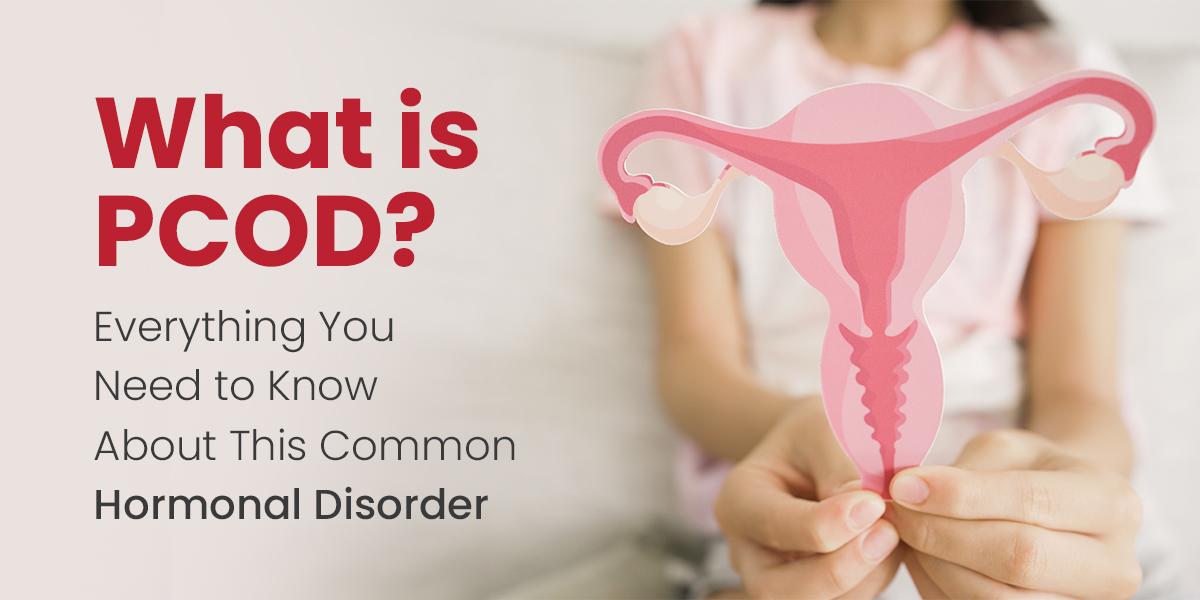What is PCOD? Everything You Need to Know About This Common Hormonal Disorder

Polycystic Ovary Disease (PCOD) or Polycystic Ovary Syndrome (PCOS) often cause confusion due to their similar names and overlapping symptoms. While we’ll delve into the differences between the two later, let’s first explore PCOD.
What is PCOD?
PCOD is a condition that affects a woman’s ovaries, leading to the formation of cysts and hormonal imbalances. These imbalances cause ovaries to produce more androgens (male hormones) than needed and can result in complications such as irregular or prolonged menstrual cycles. Ovaries may produce many tiny fluid-filled follicles and fail to ovulate regularly and if left untreated, PCOD can lead to more serious health issues like heart disease and diabetes.
PCOD vs. PCOS: What’s the Difference?
PCOD is often referred to as a disorder, while PCOS is classified as a syndrome. Disorders can have various causes, while syndromes are a collection of symptoms suggesting a specific condition. Despite the terminological differences, both terms describe conditions that affect the ovaries.
Problems Caused by PCOD
PCOD causes multiple small fluid-filled sacs (follicles) to form in ovaries, each containing an immature egg that fails to ovulate regularly. While the exact cause of PCOD remains unknown, here are some factors that might play a role:
Insulin Resistance:
Insulin resistance plays a significant role in PCOD. Insulin is a hormone produced by the pancreas and excessive insulin can stimulate ovaries to produce too much androgen.
Low-Grade Inflammation:
White blood cells produce substances in response to infection or injury, resulting in a low-level inflammatory response. Research indicates that individuals with PCOD have a form of long-term, low-grade inflammation that triggers ovaries to produce androgens, leading to heart and blood vessel complications.
Heredity:
Genetics also plays a crucial role in PCOD. Certain genes may be associated with the condition, and having a family history of PCOD can increase the likelihood of developing it.
These disruptions in ovulation and hormone balance lead to a higher release of male hormones.
PCOD Symptoms
Symptoms of PCOS can appear around the first menstrual period or develop later after you have had periods for a while. A diagnosis of PCOS is made when you have at least two of the following symptoms:
Irregular Periods:
Irregular, missed, or heavy periods are common due to irregular ovulation.
Unwanted Hair Growth:
Excess facial hair and increased body hair (hirsutism) are common signs.
Persistent Acne:
Stubborn acne on the face, chest, and back can persist beyond teenage years.
Weight Management Struggles:
Many women with PCOD struggle with obesity or maintaining a healthy weight.
Skin Changes:
Darkened patches of skin, especially in folds like the neck, armpits, groin, and under the breasts (acanthosis nigricans), can occur.
Internal Signs:
Ultrasounds may reveal enlarged ovaries or multiple small cysts (follicles).
Skin Tags:
Small flaps of extra skin on the neck or armpits can be associated with PCOD.
Hair Loss:
Thinning hair or bald patches on the scalp.
Infertility:
PCOD is a leading cause of infertility due to irregular ovulation.
Treatment for PCOD
While PCOD isn’t entirely curable, it can be effectively managed with proper treatment and lifestyle changes.
- Diagnosis typically involves ultrasound and blood tests.
- Many patients find relief through weight loss, a healthy diet, and regular exercise.
- Additionally, birth control pills and hormonal medications are commonly prescribed to manage symptoms.
Lifestyle modifications are crucial in managing PCOD. A low-fat, low-carbohydrate diet can be particularly beneficial, and maintaining a healthy weight through diet and exercise can significantly alleviate symptoms. If you suspect you have PCOD, seeking guidance from a healthcare professional is essential for proper management and treatment, don’t hesitate to consult a healthcare provider to get the necessary support and treatment. Embracing lifestyle changes and medical interventions can lead to a significant improvement in quality of life.

 Call-an-Ambulance
Call-an-Ambulance



